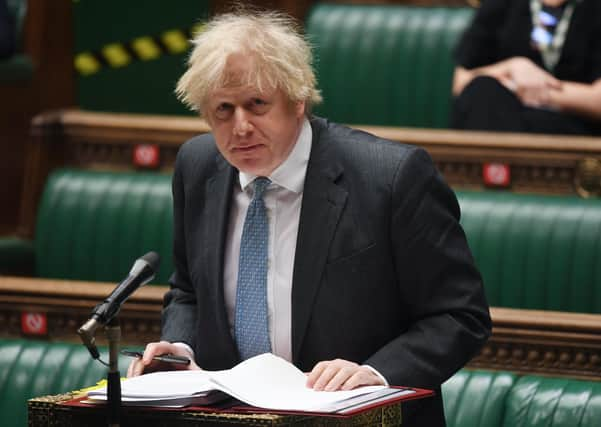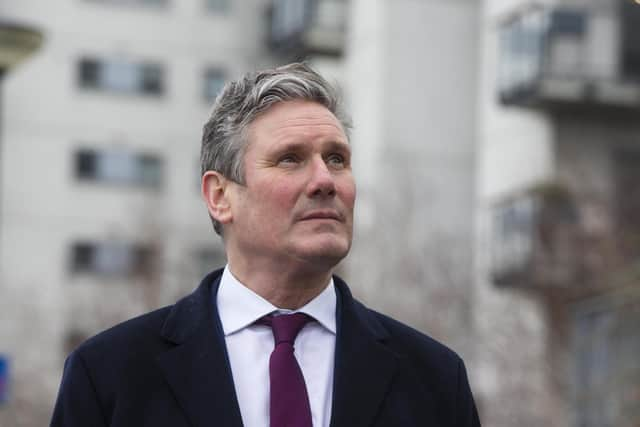How public’s love affair with Boris Johnson will end – David Blunkett


All of this has set me thinking. I realise that I’m still a politician, through and through.
Why else would Valentine’s Day turn my mind to how it is that Boris Johnson and the Conservative government are retaining such enormous support from the British people?
Advertisement
Hide AdAdvertisement
Hide AdAnd, for that matter, why Sir Keir Starmer is beginning to get such a miserable press?


The most obvious answer is one word: “Vaccine”.
The disastrous decisions taken back in the spring around the purchase of protective equipment, the test and trace debacle along with the “world beating app”, and the nepotism and cronyism – which was so evident – have begun to fade in the minds of many, as optimism and hope return.
The tolerance of the intolerable, the almost love-affair with Boris from a substantial segment of the population, is more than the success of these early stages of mass vaccination.
The truth is that normal political dividing lines are, at least temporarily, muddled and merged to the point of incredulity.
Advertisement
Hide AdAdvertisement
Hide Ad

However, the failure of the Government to give education, and therefore the equality of opportunity for young people the prominence it deserved throughout, continues to demonstrate a fault line in both experience and understanding.
But in many ways the most right-wing Cabinet for decades, many owing their place purely for having been on the right side of the Brexit argument, found itself implementing social democratic policies.
No, I’m not talking about an intellectual volte face where democratic socialism has suddenly overtaken Boris, Rishi Sunak and, dare I say it, Priti Patel.
Rather, that circumstance has demonstrated how crucial it is that government, in a crisis, acts decisively on behalf of the people it seeks to serve.
Advertisement
Hide AdAdvertisement
Hide Ad

Readers will remember the reaction to the substantial borrowing necessitated back in 2008/9 to save the banking system, and therefore the economy.
This time, of course, there is a much simpler narrative. Borrowing to protect jobs, investing to “save the NHS” and using public investment, as well as the clout of government to accelerate the development of a vaccine and its mass production, are easy to defend.
But they are, no less, based on an understanding that only by acting in this way would it be possible to prevent an even greater loss of life, the undermining of the health service and start to restore some normality to our economic and social life.
Then, of course, we have the Government’s proposed changes to the NHS, set out on Thursday, in respect of overturning what became known as the “Lansley reforms”.
Advertisement
Hide AdAdvertisement
Hide AdMuch was immediately made of the fact that the Government would be removing the most obvious competition element of the present system that is the “commissioning” services.
Some rejoiced, believing this was going to take away some of the marketisation of the NHS. Slightly more thoughtful and careful scrutiny reveals that what appears to be behind the thrust of these changes is a desire to centralise decision-making in the hands of the Secretary of State.
What I’m totally against is doing away with the flexibility and responsiveness at local level to local needs and circumstances. Had test and trace been devolved quickly a year ago, we wouldn’t have experienced that aspect of the failure to get a grip on the spread of the virus at a very early stage.
It wasn’t over-centralised, bureaucratic government decision-making that shone through the gloom and doom; it was local commitment and an embrace of common sense.
Advertisement
Hide AdAdvertisement
Hide AdFor the Opposition, there has been the terrible dilemma of not wanting to be seen to be over-critical or partisan in the face of such a calamity and the overwhelming feeling by the British people that government – any government – should be given the benefit of the doubt.
Add to this that Labour’s front bench has yet to make an impact, and that Boris and his colleagues have regular press conferences and almost daily announcements to present to the British people, and I’m not surprised that the opinion polls continue to cheer the Conservative faithful.
But, frankly, not being Jeremy Corbyn is insufficient. The tightrope that Labour is walking in terms of supporting the national effort to combat Covid 19, whilst holding the Government to account, requires a laser-like focus on what lessons need to be learnt and where the Conservatives have failed.
Failed, not because “anyone would have struggled”, but because of their own presumption of the “right to rule” to give out contracts to their friends, place Conservative stalwarts in prominent public appointments and to preach levelling-up whilst practising levelling-down.
Advertisement
Hide AdAdvertisement
Hide AdFor Labour, the challenge is not simple, but it is fairly obvious. If, post the worst of Covid, Britain is to be a better place in which to live, it will need a step-change in the way in which we distribute national resources, place emphasis on equality of opportunity and invest, for the long-term, in liberating the talent of all our people and not just the fortunate few.
Boris may, for the moment, come up smelling of roses and have the panache to blag his way through every difficult government failure. But as Valentine’s Day fades behind us, ironically it will be the “politics as usual” that will need to adapt to the very different politics of the world of tomorrow.
* David Blunkett is a Labour peer and former Home Secretary.
Support The Yorkshire Post and become a subscriber today. Your subscription will help us to continue to bring quality news to the people of Yorkshire. In return, you’ll see fewer ads on site, get free access to our app and receive exclusive members-only offers. Click here to subscribe.
Comment Guidelines
National World encourages reader discussion on our stories. User feedback, insights and back-and-forth exchanges add a rich layer of context to reporting. Please review our Community Guidelines before commenting.